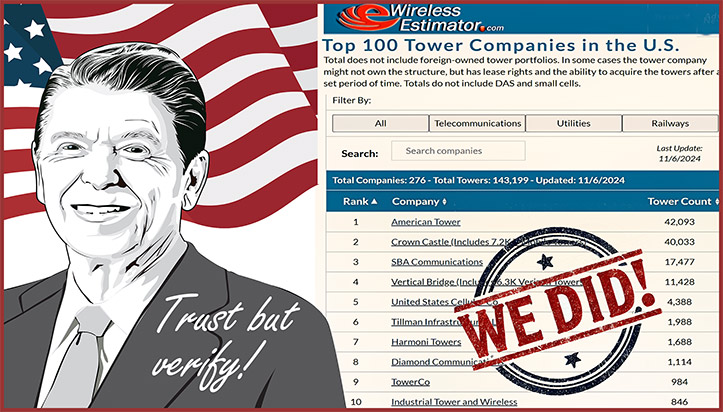
Wireless Estimator’s Top 100 Tower Companies in the U.S. list is a trustworthy guide amid industry complexity
To accurately count the top 100 U.S. companies owning ten or more towers, Wireless Estimator has adopted the 1980s Russian proverb popularized by President Ronald Reagan: “Trust, but verify.”
Because the FCC’s database and subscription-based FCC programs don’t allow users to compile lists of companies with multiple tower sites, Wireless Estimator dedicates significant time each month to ensuring that its Top 100 Tower Companies in the U.S. list remains the industry’s most reliable.
For example, a venture capital firm recently requested that they be listed since they own many towers. However, those structures were owned by companies they had invested in and would be duplicated in total counts.
The new list will allow sorting by type of industry
In this week’s update, Wireless Estimator reports that the top 100 companies, plus 176 additional firms, collectively account for 143,199 towers. The list is organized for easy sorting by telecommunications, utilities, and railways.
Though Wireless Estimator must manually review 139,000 towers in the FCC database and numerous additional sites approved but not yet built, the data is enriched by tower counts from significant aggregators.
Occasionally, tower companies report inflated numbers that include managed, approved, or speculative sites. In these cases, Wireless Estimator steps in to verify their portfolio accurately.
Publicly traded companies typically provide tower counts each quarter in their Form 10-Q, and the Securities and Exchange Commission requires high accuracy in those reports.
Although some tower structures cannot accept additional tenants, they are counted in the company’s portfolio since they can be retrofitted or replaced by another tower.
Who owns the tower?
Although Crown Castle is the nation’s second-largest towerco, their tower count, according to their most recent quarterly report, is 40,033. However, that includes approximately 7,200 T-Mobile towers that they manage for the carrier and capture revenues from all leases.
Another example is in a recent transaction, Vertical Bridge paid Verizon Communications Inc. $3.3 billion and still didn’t own the towers. What Vertical Bridge got for its bucks was the exclusive rights to lease, operate, and manage 6,339 wireless communications towers. The money that exchanged hands included a 10-year prepaid lease of approximately $2.8 billion in cash.
Verizon can extend the lease term to 50 years and access additional space on the towers for future use. The transaction appears to be another swipe by the carriers at the public tower companies’ control over wireless infrastructure.
“This agreement, along with Verizon’s existing build-to-suit joint venture with Vertical Bridge, will support Verizon’s efforts to drive down tower-related costs and provide greater vendor diversity in a concentrated industry,” said Verizon Chairman and CEO Hans Vestberg. “This transaction builds on our existing relationship with Vertical Bridge while realizing substantial value for this unique set of assets and allows us to be agile in optimizing the network with one of the best operating partners.”
Sale/leaseback tower transactions have been occurring since the 1990s, according to Clayton Funk, Managing Director of Houlihan Lokey’s Technology Group, but they are still rare.
One such transaction was American Tower Corporation’s purchase of the rights to 2,100 communications towers from AirTouch Communications Inc., now Verizon Wireless. For $800 million cash, American Tower received sublease rights to the towers covering most of AirTouch’s markets. The deal included building an additional 400 in the following three years.
“Selling towers under a master lease agreement structure or a lease partnership structure has been done multiple other times in the past,” Funk said. “It is done for tax purposes, but the most common tower sales are still straight asset acquisitions. It’s all about owning the assets. So, the Verizon tower sale structure is a total anomaly.”
Vertical Bridge is getting a portfolio with an average of only 1.1 tenants per tower, primarily likely in significant markets. So, there is a lot of runway for leasing up with a solid anchor tenant. Wells Fargo estimates that Vertical Bridge paid a multiple of 28X for the portfolio, but industry scuttlebutt has the number much higher than that.
The Top 100 Tower Companies in the U.S. list is from a database maintained and updated by Wireless Estimator. If you are a representative of a tower company and have additional updates to your total tower count, or if you are not listed and have ten towers or more, please get in touch with info@wirelessestimator.com. You cannot republish this information without obtaining permission from WirelessEstimator.com, and only the Top 10 Companies can be published along with WirelessEstimator.com as the source of the information.

















